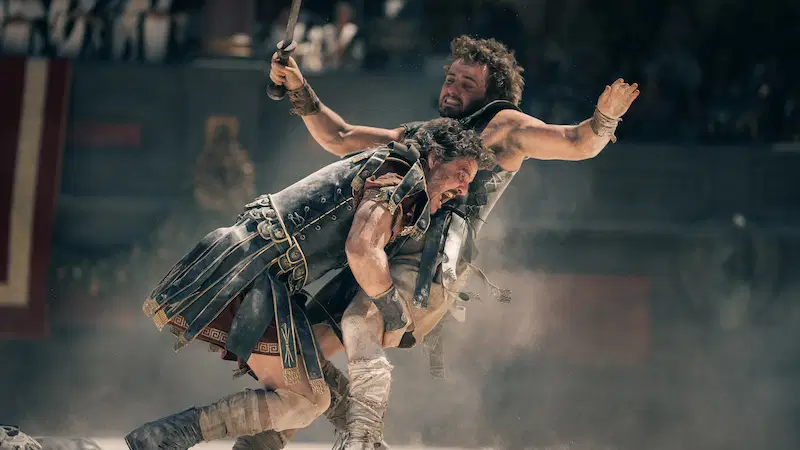Film review: Gladiator 2
Cinema / Reviews - 14 November 2024
Ridley Scott returns to the coliseum in this anticipated follow-up to his classic.

It’s been twenty-four years since Ridley Scott’s Oscar-winning epic Gladiator allured audiences. Aiming to shed the dead skin of his last few scant pictures, the 86-year old filmmaker wants to see if we are not still entertained. The Roman Empire sequel has some big shoes to fill. Films in this position strike up a clashing combination of nostalgic anticipation swirling with fear of disenchantment. None the less, those sentiments can put backsides in theatre seats.
Arrows fly, swords slash, and battle cries wail as we’re rushed into action after briefly meeting the humble and now grown Lucius (Paul Mescal, Aftersun) as a farmer and family man in a northern African Country. Fearful her child would be targeted for his hereditary position in the Roman Empire, Lucius’ mother, Lucilla, (Connie Nielsen, One Hour Photo) sent the young boy away to flee danger. The tranquility of a new life in a new land vanishes as Lucius and his wife leave to fend off invading forces led by general Marcus Acacius (Pedro Pascal, The Last of Us). With not much time to settle into the story, Lucius and his compatriots suffer both national and personal loss and are taken captive back to Rome.
Although revered by the government and the people alike, Marcus Acacius expresses his exhausted disdain for the twin-brother Emperors Caracalla and Geta, and their purposeless hunger for conquering. Pascal shows why his stock has been rising, exuding the perfect temperament of a man resistant to his superiors’ while concealing his true feelings. Noting the masses’ weariness for their tyranny, he shares plans of a coup to his wife. Turns out, his wife is Lucilla, parent of the man whose life he just upended.
Hits and misses within the plot and performances
The movie finally finds its pace once Lucius triumphs in the coliseum. His prowess impresses a diabolical Denzel Washington as Macrinus, an ambitious slave trader who sees dollar signs in Lucius’ eyes, purchasing the prisoner. Once you’re past the cheapening CGI animals, the nuance of Mescal’s performance emerges. He’s not trying to stand in the shadow of Russel Crowe’s Maximus. Rather than a stoic drive to restore justice to Rome, Lucius is more defiant and disaffected, driven by bitterness, stating “this city is diseased.” This successful element serves as a testament to the writing and Mescal’s approach on screen.
Memorable heroes are distinguished by charismatic villains. Like the spoiled boss’s son with violent impulses and an incestuous streak, Joaquin Phoenix made Commodus’s repugnance leap at you in Gladiator. Sadly, Emperors Caracalla and Geta appear as careless duplicates that lack the bite. To help carry the bad-guy load, Macrinus’ political ambitions reflect Rome’s bureaucratic entanglements, as he diffuses Acacius’ plot of revolt. Sowing division amongst the ruling twins, he sets his sights on the throne.
Scott gives us solid camera work. The set design is detailed and rich. The sound design is fitting. But the playbook is damn near identical to the precursor. Big battles, retribution, weak men in power, and togas. While nothing’s fresh in the plot department and it takes few chances, that may be what also helps the film arrive as entertaining and satisfying. Learning who his true father was, Lucius channels the energy of a people’s champ to confront Macrinus in the crowning showdown. This offering might not ride on chariots of fire, but those who can leave comparative expectations at the concession stand may find their thirsts quenched.
Jake Fraczek
© All right Reserved











